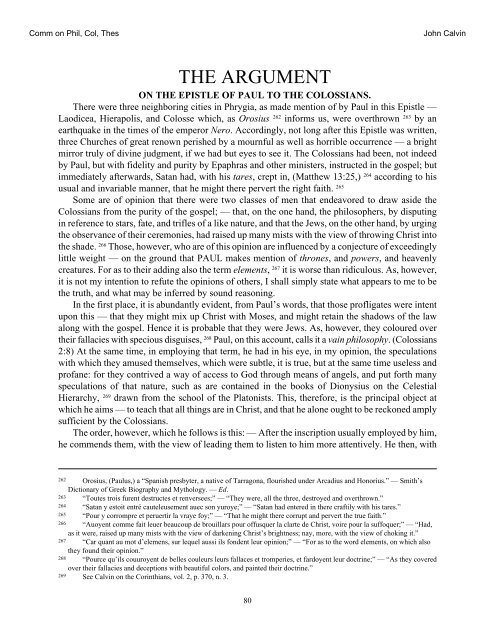Commentary on Philippians, Colossians, and Thessalonians
Commentary on Philippians, Colossians, and Thessalonians
Commentary on Philippians, Colossians, and Thessalonians
Create successful ePaper yourself
Turn your PDF publications into a flip-book with our unique Google optimized e-Paper software.
Comm <strong>on</strong> Phil, Col, Thes<br />
THE ARGUMENT<br />
ON THE EPISTLE OF PAUL TO THE COLOSSIANS.<br />
There were three neighboring cities in Phrygia, as made menti<strong>on</strong> of by Paul in this Epistle —<br />
Laodicea, Hierapolis, <strong>and</strong> Colosse which, as Orosius 262 informs us, were overthrown 263 by an<br />
earthquake in the times of the emperor Nero. Accordingly, not l<strong>on</strong>g after this Epistle was written,<br />
three Churches of great renown perished by a mournful as well as horrible occurrence — a bright<br />
mirror truly of divine judgment, if we had but eyes to see it. The <strong>Colossians</strong> had been, not indeed<br />
by Paul, but with fidelity <strong>and</strong> purity by Epaphras <strong>and</strong> other ministers, instructed in the gospel; but<br />
immediately afterwards, Satan had, with his tares, crept in, (Matthew 13:25,) 264 according to his<br />
usual <strong>and</strong> invariable manner, that he might there pervert the right faith. 265<br />
Some are of opini<strong>on</strong> that there were two classes of men that endeavored to draw aside the<br />
<strong>Colossians</strong> from the purity of the gospel; — that, <strong>on</strong> the <strong>on</strong>e h<strong>and</strong>, the philosophers, by disputing<br />
in reference to stars, fate, <strong>and</strong> trifles of a like nature, <strong>and</strong> that the Jews, <strong>on</strong> the other h<strong>and</strong>, by urging<br />
the observance of their cerem<strong>on</strong>ies, had raised up many mists with the view of throwing Christ into<br />
the shade. 266 Those, however, who are of this opini<strong>on</strong> are influenced by a c<strong>on</strong>jecture of exceedingly<br />
little weight — <strong>on</strong> the ground that PAUL makes menti<strong>on</strong> of thr<strong>on</strong>es, <strong>and</strong> powers, <strong>and</strong> heavenly<br />
creatures. For as to their adding also the term elements, 267 it is worse than ridiculous. As, however,<br />
it is not my intenti<strong>on</strong> to refute the opini<strong>on</strong>s of others, I shall simply state what appears to me to be<br />
the truth, <strong>and</strong> what may be inferred by sound reas<strong>on</strong>ing.<br />
In the first place, it is abundantly evident, from Paul’s words, that those profligates were intent<br />
up<strong>on</strong> this — that they might mix up Christ with Moses, <strong>and</strong> might retain the shadows of the law<br />
al<strong>on</strong>g with the gospel. Hence it is probable that they were Jews. As, however, they coloured over<br />
their fallacies with specious disguises, 268 Paul, <strong>on</strong> this account, calls it a vain philosophy. (<strong>Colossians</strong><br />
2:8) At the same time, in employing that term, he had in his eye, in my opini<strong>on</strong>, the speculati<strong>on</strong>s<br />
with which they amused themselves, which were subtle, it is true, but at the same time useless <strong>and</strong><br />
profane: for they c<strong>on</strong>trived a way of access to God through means of angels, <strong>and</strong> put forth many<br />
speculati<strong>on</strong>s of that nature, such as are c<strong>on</strong>tained in the books of Di<strong>on</strong>ysius <strong>on</strong> the Celestial<br />
Hierarchy, 269 drawn from the school of the Plat<strong>on</strong>ists. This, therefore, is the principal object at<br />
which he aims — to teach that all things are in Christ, <strong>and</strong> that he al<strong>on</strong>e ought to be reck<strong>on</strong>ed amply<br />
sufficient by the <strong>Colossians</strong>.<br />
The order, however, which he follows is this: — After the inscripti<strong>on</strong> usually employed by him,<br />
he commends them, with the view of leading them to listen to him more attentively. He then, with<br />
262 Orosius, (Paulus,) a “Spanish presbyter, a native of Tarrag<strong>on</strong>a, flourished under Arcadius <strong>and</strong> H<strong>on</strong>orius.” — Smith’s<br />
Dicti<strong>on</strong>ary of Greek Biography <strong>and</strong> Mythology. — Ed.<br />
263 “Toutes trois furent destructes et renversees;” — “They were, all the three, destroyed <strong>and</strong> overthrown.”<br />
264 “Satan y estoit entré cauteleusement auec s<strong>on</strong> yuroye;” — “Satan had entered in there craftily with his tares.”<br />
265 “Pour y corrompre et peruertir la vraye foy;” — “That he might there corrupt <strong>and</strong> pervert the true faith.”<br />
266 “Auoyent comme fait leuer beaucoup de brouillars pour offusquer la clarte de Christ, voire pour la suffoquer;” — “Had,<br />
as it were, raised up many mists with the view of darkening Christ’s brightness; nay, more, with the view of choking it.”<br />
267 “Car quant au mot d’elemens, sur lequel aussi ils f<strong>on</strong>dent leur opini<strong>on</strong>;” — “For as to the word elements, <strong>on</strong> which also<br />
they found their opini<strong>on</strong>.”<br />
268 “Pource qu’ils couuroyent de belles couleurs leurs fallaces et tromperies, et fardoyent leur doctrine;” — “As they covered<br />
over their fallacies <strong>and</strong> decepti<strong>on</strong>s with beautiful colors, <strong>and</strong> painted their doctrine.”<br />
269 See Calvin <strong>on</strong> the Corinthians, vol. 2, p. 370, n. 3.<br />
80<br />
John Calvin















